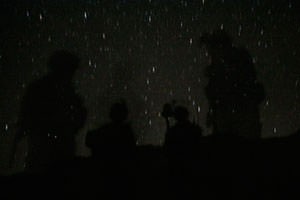It Came From Afghanistan
It's hard to read Gen Stanley McChrystal's assessment of the Afghanistan war without hearing one of those horror-movie voices that seems to come from everywhere and nowhere, a voice that grows louder and more insistent with every page: "Get out Get out"It's hard to read Gen Stanley McChrystal's assessment of the Afghanistan war without hearing one of those horror-movie voices: "Get out".
It’s hard to read Gen. Stanley McChrystal’s assessment of the Afghanistan war without hearing one of those horror-movie voices that seems to come from everywhere and nowhere, a voice that grows louder and more insistent with every page: “Get out. Get out. Get out.”
According to the confidential report prepared for President Barack Obama — obtained by Bob Woodward of The Washington Post — the situation in Afghanistan is “deteriorating.” The Taliban insurgency is “resilient and growing.” Afghans have a “crisis of confidence” in both their own government and the U.S.-led NATO occupation force. The next 12 months will be “decisive,” and “failure to gain the initiative and reverse insurgent momentum … risks an outcome where defeating the insurgency is no longer possible.”
Obama said consistently during the election campaign that Afghanistan, not Iraq, was the right place for the United States to fight al-Qaida and its allies. Now the messy conflict in Afghanistan has become Obama’s war, and the president faces his most consequential decision thus far: whether he still believes his war can be “won” by military means.
“The mission is achievable,” McChrystal writes. The bulk of his report, however, strongly suggests it’s not.
As if on cue, the leader of the Taliban, Mohammad Omar, issued a taunting statement reminding Obama that for more than a millennium would-be conquerors have tried and failed to subdue the mountain fastness known as the “graveyard of empires” — Alexander the Great in the 4th century B.C., the British in the 1800s, the Soviets from 1979 to 1989.
“The invaders should study the history of Afghanistan,” Omar said in a message marking the end of Ramadan, reported the Financial Times. “The more the enemy resorts to increasing forces, the more they will face an unequivocal defeat.”
As galling as it is to accept tutelage from one of Osama bin Laden’s key enablers, this does seem to be what history teaches. Pouring forces into Afghanistan has always proved counterproductive. The presence of large numbers of foreign troops is the one thing that reliably unites Afghans — if only for long enough to drive the foreigners out.
Yet an additional surge in U.S. forces is precisely what McChrystal recommends — he calls it a “jump” in resources, presumably since “surge” is such a Bush-era word, but the effect would be the same. Declining to send more troops — troops that would provide a “bridge capability” until the Afghan army can be further expanded, equipped and trained — would “lead to failure,” the general writes.
Already, there are about 62,000 U.S. troops in Afghanistan, with the number set to rise to 68,000 — more than double the U.S. commitment of a year ago. McChrystal doesn’t specify numbers in his report, but his predecessor asked for an additional 10,000 troops. As a comparison, the Soviet Union’s military presence in Afghanistan peaked at just over 100,000 troops — a number that proved pitifully too small to pacify a country larger than France and with a population now estimated at nearly 30 million.
McChrystal at least tries to outline a clear mission in Afghanistan: strengthening the Afghan state to the point where it can “sufficiently control its territory to support regional stability and prevent its use for international terrorism.”
He proposes a counterinsurgency strategy that could indeed inflict serious damage on the Taliban. In the process, though, McChrystal’s plan seems unlikely to boost confidence in the weak and corrupt Afghan government, especially following the recent elections that saw widespread, credible allegations of fraud. And as unpopular as the Taliban may be, does anyone believe that Afghans are really going to side with foreigners? Do we think that civilian casualties from aerial attacks — which would have to continue, given the size of the country and the ruggedness of its terrain — are helping to win Afghan hearts and minds? Can 1,400 years of history be so blithely ignored?
What Obama needs to do is downsize the mission. Our only goals should be to satisfy ourselves that Afghanistan will not again be a terrorist haven, and to leave as quickly as possible. We need to use not just force but also diplomacy — which means, yes, talking to the Taliban.
Some will say this shows weakness, but the ultimate sign of weakness is failure. If we send in more troops, I fear that’s where we’re headed.
Eugene Robinson’s e-mail address is eugenerobinson(at)washpost.com.
© 2009, Washington Post Writers Group
Your support matters…Independent journalism is under threat and overshadowed by heavily funded mainstream media.
You can help level the playing field. Become a member.
Your tax-deductible contribution keeps us digging beneath the headlines to give you thought-provoking, investigative reporting and analysis that unearths what's really happening- without compromise.
Give today to support our courageous, independent journalists.






You need to be a supporter to comment.
There are currently no responses to this article.
Be the first to respond.